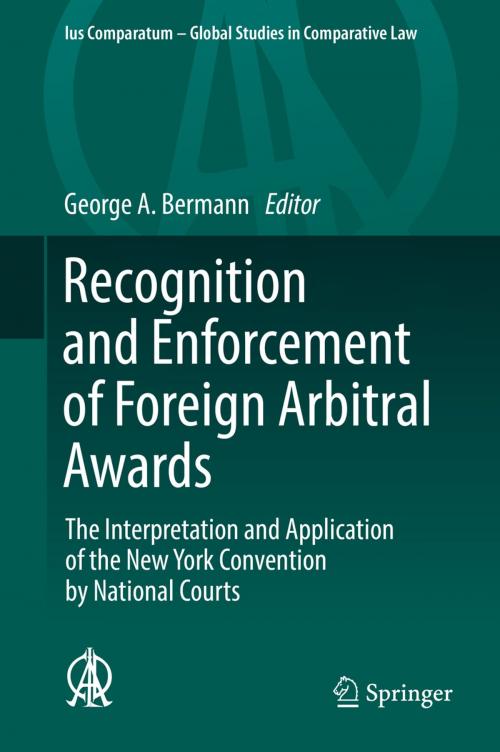Recognition and Enforcement of Foreign Arbitral Awards
The Interpretation and Application of the New York Convention by National Courts
Nonfiction, Reference & Language, Law, Arbitration, Negotiation, & Mediation, International| Author: | ISBN: | 9783319509150 | |
| Publisher: | Springer International Publishing | Publication: | July 17, 2017 |
| Imprint: | Springer | Language: | English |
| Author: | |
| ISBN: | 9783319509150 |
| Publisher: | Springer International Publishing |
| Publication: | July 17, 2017 |
| Imprint: | Springer |
| Language: | English |
This book examines how the Convention on the Recognition and Enforcement of Foreign Arbitral Awards, commonly known as The New York Convention, has been understood and applied in [insert number] jurisdictions, including virtually all that are leading international arbitration centers. It begins with a general report surveying and synthesizing national responses to a large number of critical issues in the Convention’s interpretation and application. It is followed by national reports, all of which are organized in accordance with a common questionnaire raising these critical issues.
Following introductory remarks, each report addresses the following aspects of the Convention which include its basic implementation within the national legal system; enforcement by local courts of agreements to arbitrate (including grounds for withholding enforcement), recognition and enforcement of foreign awards by local courts under the Convention (including grounds for denying recognition and enforcement), and essential procedural issues in the courts’ conduct of recognition and enforcement. Each report concludes with an overall assessment of the Convention’s interpretation and application on national territory and recommendations, if any, for reform.
The New York Convention was intended to enhance the workings of the international arbitral system, primarily by ensuring that arbitral awards are readily recognizable and enforceable in States other than the State in which they are rendered, subject of course to certain safeguards reflected by the Convention’s limited grounds for denying recognition or enforcement. It secondarily binds signatory states to enforce the arbitration agreements on the basis of which awards under the Convention will be rendered.
Despite its exceptionally wide adoption and its broad coverage, the New York Convention depends for its efficacy on the conduct of national actors, and national courts in particular. Depending on the view of international law prevailing in a given State, the Convention may require statutory implementation at the national level. Beyond that, the Convention requires of national courts an apt understanding of the principles and policies that underlie the Convention’s various provisions. Through its in-depth coverage of the understandings of the Convention that prevail across national legal systems, the book gives practitioners and scholars a much-improved appreciation of the New York Convention “on the ground.”
This book examines how the Convention on the Recognition and Enforcement of Foreign Arbitral Awards, commonly known as The New York Convention, has been understood and applied in [insert number] jurisdictions, including virtually all that are leading international arbitration centers. It begins with a general report surveying and synthesizing national responses to a large number of critical issues in the Convention’s interpretation and application. It is followed by national reports, all of which are organized in accordance with a common questionnaire raising these critical issues.
Following introductory remarks, each report addresses the following aspects of the Convention which include its basic implementation within the national legal system; enforcement by local courts of agreements to arbitrate (including grounds for withholding enforcement), recognition and enforcement of foreign awards by local courts under the Convention (including grounds for denying recognition and enforcement), and essential procedural issues in the courts’ conduct of recognition and enforcement. Each report concludes with an overall assessment of the Convention’s interpretation and application on national territory and recommendations, if any, for reform.
The New York Convention was intended to enhance the workings of the international arbitral system, primarily by ensuring that arbitral awards are readily recognizable and enforceable in States other than the State in which they are rendered, subject of course to certain safeguards reflected by the Convention’s limited grounds for denying recognition or enforcement. It secondarily binds signatory states to enforce the arbitration agreements on the basis of which awards under the Convention will be rendered.
Despite its exceptionally wide adoption and its broad coverage, the New York Convention depends for its efficacy on the conduct of national actors, and national courts in particular. Depending on the view of international law prevailing in a given State, the Convention may require statutory implementation at the national level. Beyond that, the Convention requires of national courts an apt understanding of the principles and policies that underlie the Convention’s various provisions. Through its in-depth coverage of the understandings of the Convention that prevail across national legal systems, the book gives practitioners and scholars a much-improved appreciation of the New York Convention “on the ground.”















